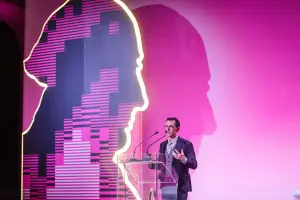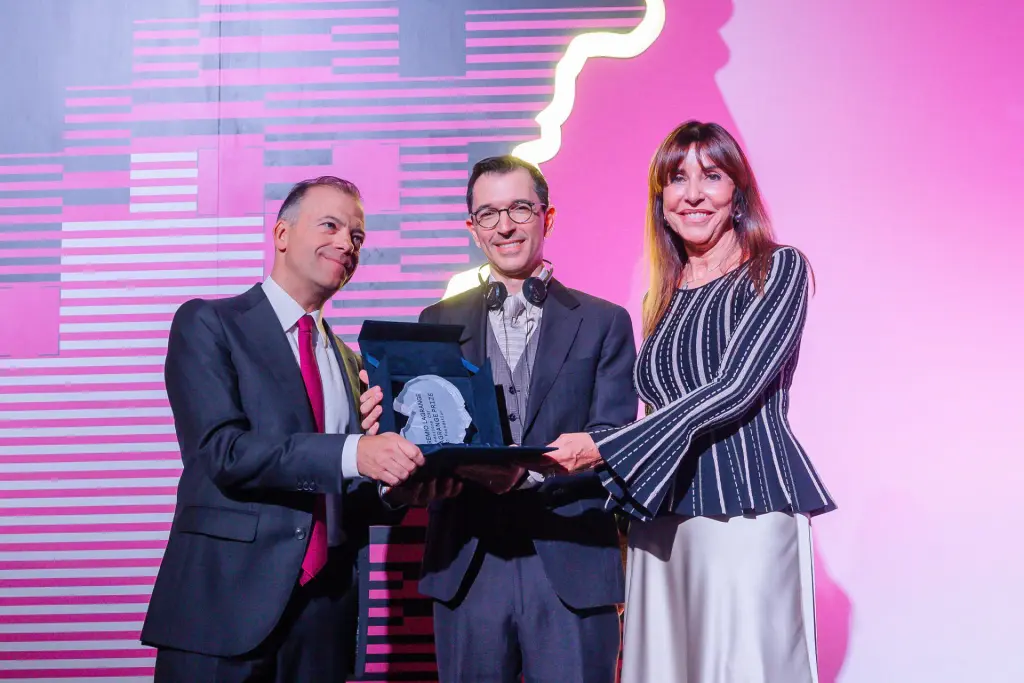Artificial intelligences are not just collections of data and algorithms—they are complex systems that shape contemporary societies and feed on the very data we produce.
 “If I had to explain to a child what image to associate with Artificial Intelligence, I would draw a metallic mechanical robot—designed and built like a car that responds to precise commands and, thanks to its vast potential, is able to shape society while also being influenced by it.”
“If I had to explain to a child what image to associate with Artificial Intelligence, I would draw a metallic mechanical robot—designed and built like a car that responds to precise commands and, thanks to its vast potential, is able to shape society while also being influenced by it.”With this statement, Syrian-born scientist Iyad Rahwan, a leading scholar of human–machine interaction in contemporary society whose academic path spans Australia, the United Arab Emirates, the United States, and Germany, highlights how intelligent machines play not only a technological role but also one of social interaction and relationship. They reflect the biases, norms, and moral choices of human communities.
Rahwan’s research—approaching AI not merely as a set of algorithms and data, but as a complex system producing social effects and influencing interactions between humans and machines—has earned him the 2025 Lagrange–Fondazione CRT Prize, the world’s highest distinction in the field of Complex Systems and Data Science. The award is established and funded by Fondazione CRT and coordinated by the ISI Foundation – Institute for Scientific Interchange, based in Turin.
Iyad Rahwan’s vision of Artificial Intelligence
At the Max Planck Institute for Human Development in Berlin, Prof. Rahwan and his team study how artificial intelligence influences every aspect of human life—while the human ecosystem, shaped by languages, values, history, and prejudices, provides the very “nourishment” with which AI is trained.
This creates what Rahwan calls co-evolution, where machines learn from the information generated by people and adapt to collective human behavior—often imperfectly.
How can we observe a machine in its natural habitat? According to Rahwan, it is necessary to systematically study the outputs and behaviors of systems already in operation. Yet, because modern technologies are highly complex and unpredictable, this is not always enough: algorithms designed for one purpose may produce unintended side effects once deployed at scale. Therefore, he argues for a new interdisciplinary scientific framework—one that draws on biology, economics, and the social sciences—to understand the phenomena that emerge when millions of humans and artificial intelligences interact.
So, is AI truly a new form of intelligence, or merely a mirror of human intelligence? Rahwan’s research concludes that both are true: AI acts as a distorting mirror reflecting humanity, society, knowledge, and human error, while simultaneously representing a new kind of intelligence—one that does not reproduce human thought but explores entirely alien territories that require deep study.
Ethical questions are central to this vision. Data collected in Rahwan’s studies—such as the Moral Machine Experiment and Machine Behaviour—demonstrate that no universal ethics for AI can exist. The goal should not be to design a single moral code to program into machines, but rather to create processes that allow different communities and cultures to deliberate and decide which values their machines should reflect.
The social dilemmas of AI, therefore, are not abstract or intellectual enigmas—they are deeply human ones. For this reason, Rahwan has also turned to art as a way to express the social impact of complex algorithms through visceral experience. In his media art projects—exhibited at major cultural institutions—he uses painting to document how intelligent machines shape human perception of the world.
“The Lagrange–Fondazione CRT Prize, promoted with ISI Foundation—our long-standing partner in innovation and research—is a tangible example of how collaboration between institutions can generate knowledge, innovation, and social impact,” said Anna Maria Poggi, President of Fondazione CRT. “Data science and artificial intelligence have extraordinary transformative potential for good, but this digital revolution must be guided and co-constructed also by philanthropic institutions—free from market or short-term logics—that can look to the future responsibly. Fondazione CRT invests resources and energy to strengthen the innovation ecosystem and promote research that creates value for society. Professor Rahwan’s work, exploring the relationship between artificial intelligence and human behavior, perfectly embodies this approach: a vision of technology as a system that shapes our era, where science, ethics, and social responsibility meet.”
14 years of the Lagrange–Fondazione CRT Prize
For 14 years, Fondazione CRT and ISI Foundation have honored researchers and scientists who excel in the study of complexity—economists, physicists, biologists, and epidemiologists of international standing who have advanced multidisciplinary collaboration and applied research addressing the central challenges of equitable and sustainable development.
The 2025 Lagrange–Fondazione CRT Prize ceremony will take place on Tuesday, October 28, at 6:30 PM, at OGR Torino (Corso Castelfidardo 22), Binario 3.
The event will feature a conversation between Iyad Rahwan and Prof. Teresa Numerico (Roma Tre University), moderated by journalist Andrea Capocci, exploring the themes of the award and the impact of artificial intelligence on society.
Hall of Fame
2024 — Marta C. González (Civil and Environmental Engineering, USA)
2023 — Tina Eliassi-Rad (Computer Science, USA)
2019 — Iain D. Couzin (Biologist, UK) and David Gruber (Biologist and Explorer, USA)
2018 — César Hidalgo (Physicist, Chile/USA)
2017 — Danielle S. Bassett (Physicist and Neuroscientist, USA)
2016 — John Brownstein (Epidemiologist, Canada)
2015 — Panos Ipeirotis (Computer Scientist, Greece) and Jure Leskovec (Computer Scientist, Slovenia)
2014 — Mark Newman (Physicist, UK)
2013 — Duncan J. Watts (Physicist and Sociologist, Australia)
2012 — Lada Adamic (Social Networks Scholar, USA) and Xavier Gabaix (Economist, France)
2011 — Albert László Barabási (Physicist, Hungary/USA)
2010 — James J. Collins (Bioengineer, USA)
2009 — Giorgio Parisi (Physicist, Italy)
2008 — Yakov Grigorievich Sinai (Mathematician, Russia) and William Brian Arthur (Economist, UK)


